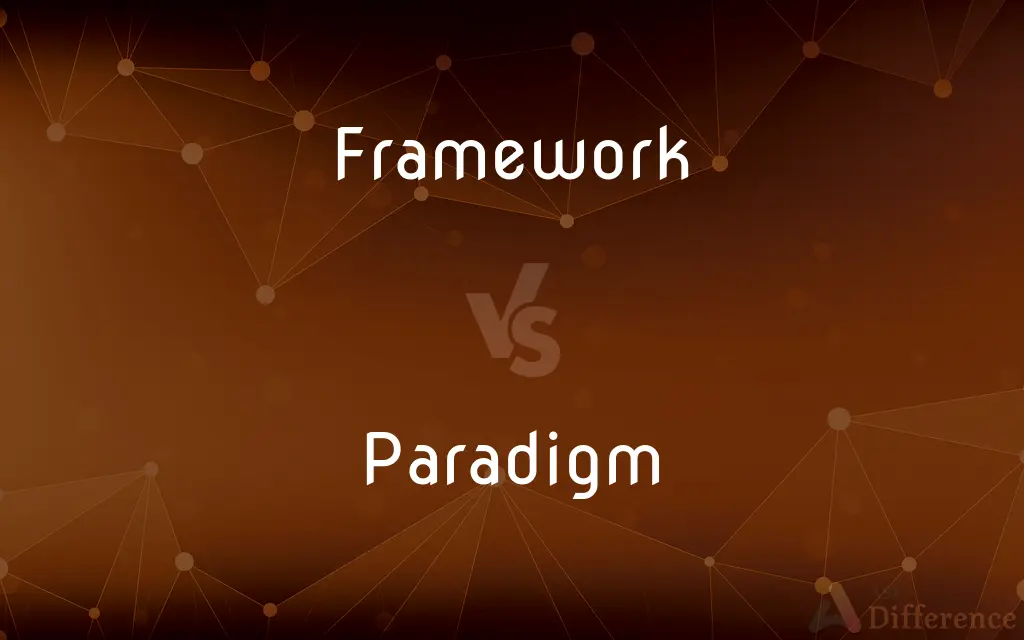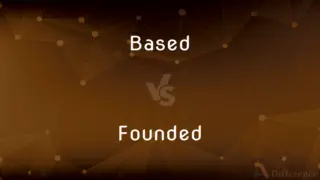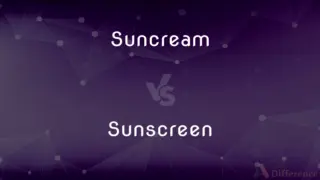Framework vs. Paradigm — What's the Difference?
By Tayyaba Rehman & Urooj Arif — Updated on April 4, 2024
A framework is a structured platform for developing software applications, offering libraries and tools, while a paradigm is an overarching approach or methodology guiding problem-solving and programming styles.

Difference Between Framework and Paradigm
Table of Contents
ADVERTISEMENT
Key Differences
Frameworks provide a concrete base and set of tools designed for application development, facilitating the process by offering predefined classes and functions. Whereas paradigms offer a theoretical model for understanding and approaching programming challenges, focusing on the principles and concepts that guide software development.
Frameworks are often language-specific, supporting development within a particular programming environment or ecosystem. On the other hand, paradigms transcend specific languages, embodying approaches like object-oriented or functional programming that can be applied across multiple languages.
Frameworks aim to reduce the complexity of software development by standardizing code and reducing the need for repetitive tasks. Paradigms, however, aim to shape the way developers think about and solve programming problems, influencing design patterns and software architecture.
Developers choose frameworks based on technical requirements, project needs, and personal preference for tools and libraries. Conversely, the choice of paradigm often reflects a developer's theoretical preferences and the nature of the problem being solved, whether it demands procedural, object-oriented, functional, or declarative programming styles.
While frameworks can be switched or modified within a project with varying degrees of difficulty, changing paradigms can require a fundamental rethink of the project’s structure, design, and existing codebase.
ADVERTISEMENT
Comparison Chart
Nature
Concrete tools and libraries for development.
Conceptual approach to problem-solving.
Scope
Language-specific, used in software development.
Transcends languages, applicable in various programming contexts.
Function
Reduces complexity and repetitive tasks in development.
Guides thinking and problem-solving methods.
Choice Criteria
Based on project needs and technical requirements.
Influenced by theoretical preference and problem nature.
Flexibility
Can be changed with effort, affecting project structure.
Changing paradigms may require a fundamental redesign.
Compare with Definitions
Framework
A structured foundation for developing applications.
The Django framework simplifies web development with Python.
Paradigm
A theoretical model guiding programming styles and methodologies.
The object-oriented paradigm emphasizes the importance of objects in programming.
Framework
Facilitates rapid development by reducing boilerplate code.
Spring framework's dependency injection speeds up application setup.
Paradigm
Transcends programming languages, applicable in various contexts.
Functional programming paradigm can be applied in languages like Haskell and JavaScript.
Framework
Incorporates predefined classes and functions for ease of use.
Using the .NET framework allowed us to integrate various services easily.
Paradigm
Influences software design and architecture.
The declarative paradigm is central to the design of SQL and HTML.
Framework
Can be specific to programming languages or platforms.
The Flutter framework is used for cross-platform mobile app development.
Paradigm
Reflects theoretical preferences and problem-solving strategies.
Choosing the imperative paradigm involves manipulating program state through commands.
Framework
Offers libraries and tools tailored to specific development needs.
The React framework provides a robust library for building user interfaces.
Paradigm
Shapes the way developers approach problem-solving.
The procedural paradigm focuses on a sequence of procedures for task execution.
Framework
An essential supporting structure of a building, vehicle, or object
A conservatory in a delicate framework of iron
Paradigm
In science and philosophy, a paradigm () is a distinct set of concepts or thought patterns, including theories, research methods, postulates, and standards for what constitutes legitimate contributions to a field.
Framework
A structure for supporting or enclosing something else, especially a skeletal support used as the basis for something being constructed.
Paradigm
A typical example or pattern of something; a pattern or model
Society's paradigm of the ‘ideal woman’
Framework
An external work platform; a scaffold.
Paradigm
A set of linguistic items that form mutually exclusive choices in particular syntactic roles
English determiners form a paradigm: we can say ‘a book’ or ‘his book’ but not ‘a his book’
Framework
A fundamental structure, as for a written work.
Paradigm
(in the traditional grammar of Latin, Greek, and other inflected languages) a table of all the inflected forms of a particular verb, noun, or adjective, serving as a model for other words of the same conjugation or declension.
Framework
A set of assumptions, concepts, values, and practices that constitutes a way of viewing reality.
Paradigm
One that serves as a pattern or model.
Framework
(literally) A support structure comprising joined parts or conglomerated particles and intervening open spaces of similar or larger size.
Paradigm
A set or list of all the inflectional forms of a word or of one of its grammatical categories
The paradigm of an irregular verb.
Framework
(literally) The arrangement of support beams that represent a building's general shape and size.
Paradigm
A set of assumptions, concepts, values, and practices that constitutes a way of viewing reality for the community that shares them, especially in an intellectual discipline.
Framework
(figuratively) The larger branches of a tree that determine its shape.
Paradigm
A pattern, a way of doing something, especially a pattern of thought, a system of beliefs, a conceptual framework.
Thomas Kuhn's landmark “The Structure of Scientific Revolutions” got people talking about paradigm shifts, to the point the word itself now suggests an incomplete or biased perspective.
Framework
(figuratively) A basic conceptual structure.
These ‘three principles of connexion’ compose the framework of principles in Hume's account of the association of ideas.
Paradigm
An example serving as the model for such a pattern.
Framework
(software engineering) A reusable piece of code (and, sometimes, other utilities) providing a standard environment within which an application can be implemented.
Paradigm
(linguistics) A set of all forms which contain a common element, especially the set of all inflectional forms of a word or a particular grammatical category.
The paradigm of "to sing" is "sing, sang, sung". The verb "to ring" follows the same paradigm.
Framework
(grammar) An established and structured system of rules and principles used for analyzing and describing the structure of a language.
Paradigm
An example; a model; a pattern.
Framework
The work of framing, or the completed work; the frame or constructional part of anything; as, the framework of society.
A staunch and solid piece of framework.
Paradigm
An example of a conjugation or declension, showing a word in all its different forms of inflection.
Framework
Work done in, or by means of, a frame or loom.
Paradigm
An illustration, as by a parable or fable.
Framework
A simplified description of a complex entity or process;
The computer program was based on a model of the circulatory and respiratory systems
Paradigm
A theory providing a unifying explanation for a set of phenomena in some field, which serves to suggest methods to test the theory and develop a fuller understanding of the topic, and which is considered useful until it is be replaced by a newer theory providing more accurate explanations or explanations for a wider range of phenomena.
Framework
The underlying structure;
Restoring the framework of the bombed building
It is part of the fabric of society
Paradigm
Systematic arrangement of all the inflected forms of a word
Framework
A structure supporting or containing something
Paradigm
A standard or typical example;
He is the prototype of good breeding
He provided America with an image of the good father
Paradigm
The class of all items that can be substituted into the same position (or slot) in a grammatical sentence (are in paradigmatic relation with one another)
Paradigm
The generally accepted perspective of a particular discipline at a given time;
He framed the problem within the psychoanalytic paradigm
Common Curiosities
Can you use multiple frameworks in a single project?
Yes, it's possible to use multiple frameworks, though it may increase complexity.
Can a project employ multiple paradigms?
Yes, projects can blend paradigms, like object-oriented and functional, for different parts of the application.
What is a framework?
A structured platform with tools and libraries for software development.
What is a paradigm?
A conceptual approach that guides programming methodologies and problem-solving.
Do paradigms transcend programming languages?
Yes, paradigms like object-oriented or functional can be applied across various languages.
What influences the choice of a programming paradigm?
Developer preferences, the nature of the problem, and the desired software design.
Can switching frameworks affect a project?
Yes, changing frameworks can require significant adjustments to the project’s structure.
Are frameworks language-specific?
Most frameworks are designed for specific programming languages or platforms.
How does a framework differ from a paradigm?
Frameworks offer concrete development tools, whereas paradigms provide theoretical models for approaching problems.
Why are frameworks used in software development?
To simplify development by providing structured tools and reducing repetitive tasks.
Are there frameworks for specific development tasks?
Yes, there are frameworks tailored for web development, mobile applications, and more.
What's an example of a commonly used paradigm?
The object-oriented paradigm is widely used for its emphasis on objects and classes.
How does changing paradigms impact a project?
It may necessitate a fundamental redesign of the project’s architecture and codebase.
What's an example of a popular framework?
React is a popular framework for building user interfaces.
How do paradigms influence software architecture?
They guide the overall design patterns and structural decisions in software development.
Share Your Discovery

Previous Comparison
Based vs. Founded
Next Comparison
Suncream vs. SunscreenAuthor Spotlight
Written by
Tayyaba RehmanTayyaba Rehman is a distinguished writer, currently serving as a primary contributor to askdifference.com. As a researcher in semantics and etymology, Tayyaba's passion for the complexity of languages and their distinctions has found a perfect home on the platform. Tayyaba delves into the intricacies of language, distinguishing between commonly confused words and phrases, thereby providing clarity for readers worldwide.
Co-written by
Urooj ArifUrooj is a skilled content writer at Ask Difference, known for her exceptional ability to simplify complex topics into engaging and informative content. With a passion for research and a flair for clear, concise writing, she consistently delivers articles that resonate with our diverse audience.











































